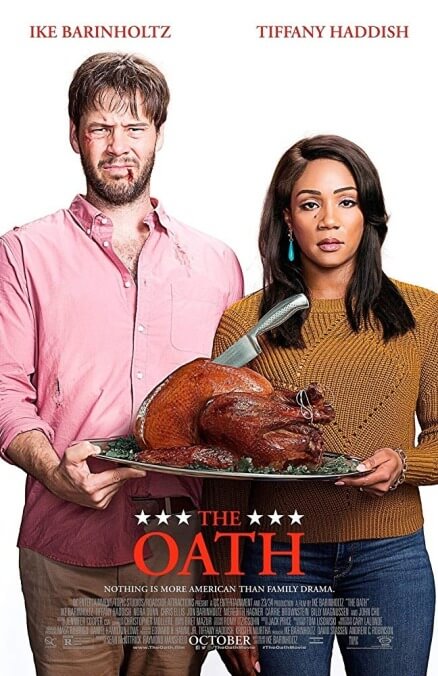Ike Barinholtz and Tiffany Haddish tackle the rancor of the Trump era by taking The Oath

Is there any workable way to make a movie satirizing the rancor and viciousness of Trump-era politics without dissolving into trite both-sides-so-crazy fallacies? In The Oath, his first feature as a writer-director, comic actor Ike Barinholtz zeroes in on an approach somewhere between caustic stage comedy and The Purge. The movie isn’t always up to the delicacy of that ambitious balancing act, but even the attempt is engaging.
The premise is laid out with sketch-comedy directness. An unnamed but familiar-sounding administration announces an “optional” pledge of loyalty to the president that everyone in the United States is cheerfully encouraged to sign if they feel so moved. Oh, and there’s a firm day-after-Thanksgiving deadline, with abstainers possibly investigated by the “CPU”—the Citizens Protection Unit, who supposedly want to make sure dissenters aren’t pressuring more cooperative folks.
A nonsensical but threateningly vainglorious loyalty oath carries disturbing plausibility—as does the reaction of Chris (Barinholtz), a family man who stews, seethes, and rants about the state of the country while obsessively checking the news for additional fuel. His wife, Kai (Tiffany Haddish), agrees with him almost completely, though with a more practical-minded sensibility centered on the safety of their young daughter. Kai’s main point of contention with Chris is that she claims to find his family, who is visiting their home for Thanksgiving, far more tolerable than he does.
Barinholtz’s portraiture in this gathering is well-observed. There’s the faux-apolitical posturing of Chris’s parents (Nora Dunn and Chris Ellis), who really just want their beliefs to go unchallenged by any impolite dinner-table chatter; the passive-aggressive asides from Chris’s smug brother, Pat (Barinholtz’s real-life brother Jon) and his self-absorbed girlfriend, Abbie (Meredith Hagner); attempts at peacekeeping from Chris’s lefty but less confrontational sister, Alice (Carrie Brownstein); and Chris’s own inability to let his family off the hook for their ignorance and casual racism.
It’s that last bit where The Oath feels freshest in its satire. Chris’s principles—that signing a loyalty oath is creepy and fascistic, that police shouldn’t fire on crowds of protests, and so on—are entirely reasonable. But Barinholtz digs into a familiar yet largely untapped type: the justifiably angry liberal who’s nonetheless inarticulately confrontational when overwhelmed with the world’s stupidity and cruelty. Chris can’t stop picking unwinnable fights, and peppers his arguments with self-congratulatory allyship (see his perfectly name-dropped Roxane Gay fandom), but the movie also never really suggests that he needs to listen to the other side so much as, perhaps, find a more productive outlet for his anger, especially as it relates to the loyalty oath. Barinholtz has an outsized presence that can be hard to take in more traditional comic parts; in some of his work, he undermines his scene-stealing when he seems to loudly announce his intentions from the moment he appears. But here his willingness to lean into an overbearing character mostly pays off.
After a series of bitter family arguments over the holiday weekend, two CPU agents (John Cho and Billy Magnussen) turn up at Chris and Kai’s house, asking questions about a disturbance. One of the agents is more polite and the other more aggressive, but their requests are menacing, Chris resists, and everything escalates from there. Barinholtz, who generally evinces a steady directorial hand where plenty of filmmakers would have gone fast and loose, doesn’t always have a handle on how to tighten suspense rather than simply draw it out with repetition. If Chris bringing various characters into separate rooms to have contentious conversations about crisis-managing strategy is supposed to be a running gag, it winds up feeling more like an absence of interesting staging, or an inability to juggle his ensemble. The performances keep things running. Haddish, given slow-burn frustration rather than bravado, and Brownstein, finding comic honesty in a potential caricature, are especially strong. They could have been given more to do than react.
True to real life but unsatisfying to actually experience, The Oath doesn’t know exactly how to resolve the situation it backs itself into. Instead of something genuinely thought-provoking or unnerving, Barinholtz settles on a combination of broad narrative cop-out and details that don’t quite make sense, though at least its falling-action scenes score a few more laughs on their way to the finish line. This consistently smart and intermittently hilarious movie seems uncertain about whether to laugh, cry, give up, or reach out in empathy. In other words, even when it falters, it feels authentic to its moment.